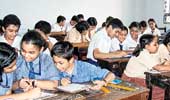 |
| Students at a Mathematics for Fun exam |
Three coloured pulses (dal) are given. Use them in the ratio of 5:8:10 (any colour combination you like). Repeat the group at least four times and form a closed geometrical figure having at least one line of symmetry (where each side of the line is a mirror image of the other side).
A math question like this might trigger many an unpleasant memory among adults but children who become upset at the mere mention of the word “math” solved such activity-based problems at an annual fun test held in the city last year.
Organised by the Centre for Pedagogical Studies in Mathematics, the test attempts to help students overcome their fear of the subject.
This year, Mathematics for Fun will be held at Sakhawat Memorial Government Girls’ High School on March 20. It will be open to students of classes VI and VII.
According to members of the centre, about 30 students in a class of 50 are afraid of math and they are the ones that schools are asked to send for the test in groups of three.
“We provide a care-free environment for the test. Invigilators are rarely in the room where the test is being conducted. Students are allowed to discuss the task at hand with their two teammates. There is plenty of time and no fear of being denied promotion if you do not do well,” said Arundhati Mukherjee, a math teacher and a co-ordinator of the centre.
“These things, along with physical activity, like using cardboard pieces to solve geometry and mensuration problems, help students realise that math can be enjoyed. Examinees, for example, are asked to arrange eight train tickets cut into two to form a polygon with the longest possible perimeter,” she added.
Bijon Ganguly, a former teacher of St Xavier’s Collegiate School, lauded the endeavour saying that math teaching should be based on concepts rather than formulae. “If you explain the Pythagoras theorem to students with square cardboard cut-outs, they will never forget the formula,” he said.
Child psychologist Mahua Ghosh feels children develop math phobia because the subject is given the most importance. “If a child is good in math he or she is considered good in studies,” said Ghosh.
According to the centre’s founder-director S.N. Giri, a former teacher at the David Hare Training College, the test does not try to turn students poor in maths into those good in the subject. Instead, the effort is to make them approach the subject fearlessly, which in turn would lead to better marks.
“Our students enjoyed themselves quite a bit during last year’s test, which was for students of classes VII and VIII. There was a change in their attitude towards math as well,” said Jayashree Kundu, a teacher at Udbhas, a free school for underprivileged children that operates in a parking lot on the ground floor of an office in Dhakuria.
Centre members rued the fact that Bengali-medium government schools hardly took part in the test.
“Our endeavour can only be successful when we reach the poorer schools because a lot of students there have problems with math,” said Giri.
The centre also organises math camps, where the stress is on reasoning and students are encouraged “to arrive at solutions before they are fed formulae”, as well as assessment-cum-diagnostic tests that over 30,000 meritorious students from different schools take.











